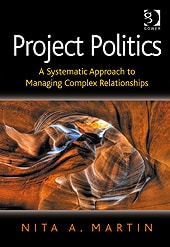Talking Project Politics: Interview with Nita Martin
This blog is reader-supported. When you purchase something through an affiliate link on this site, I may earn some coffee money. Thanks! Learn more.

Politics. Every project has politics. Today I’m interviewing Dr Nita Martin, Managing Director of Pure Indigo. Nita’s book, Project Politics: A Systematic Approach to Managing Complex Relationships, deals with that difficult subject of how things get done on projects.
Nita, ‘politics’ means different things to different people. How do you define project politics?
‘Project politics’ is a commonly used phrase on projects. I find that a useful definition of this is the processes by which decisions are made by people for the governing of a project’s internal and external affairs.
There are office politics in every organisation. Do you think that projects have a more political environment than business as usual work?
The comparison is a difficult one to make since it is dependent on the nature of the project and the normal business environment. However, in my experience, business as usual is normally fairly stable with only gradual changes to the working environment. Projects can create the feeling of a more charged political environment simply due to the uniqueness and intensity often associated with projects. People are often thrown together and might find themselves in a working environment that they are not accustomed to.
That makes sense. That unique environment must also throw up problems that might remain hidden in a different working environment. What should we be looking out for?
Political situations do not automatically equate to problems on projects. A useful tip for identifying problematic political issues is by keeping an eye on the overall objective of the project and whether there are interactions that could impact the project’s delivery. Typical examples of when this may occur is when you have new people joining a team or when there is a change in the project sponsor. Every situation is unique and so what might be considered a problem on one project may not be a problem on another.
So much of how we deal with project politics seems to be based on gut feel. You cover a lot of theory in the book. What’s the most useful piece of theory you uncovered during your research and how can we put it into practice?
That’s easy – Maslow’s theory of human motivation. This is a relatively simple theory that can really help to understand different point of views. This theory enables you to consider how different levers may be influencing the behaviour of individuals, for example, a need for security, validation, creativity and so on.
The reason this is so useful is because it is very easy to fall into the trap of thinking that whatever your interpretation of a situation and motivation is that this will be the same for others. It is difficult to judge situations from somebody else’s point of view and come to a different conclusion than that which you have to come for yourself. Once you understand that people can be motivated in different ways and have different needs then it makes it easier to recognise and understand different behaviours.

By far the ones that are most successful have an excellent ability to remain calm and level-headed in political situations. In addition, they are able to carefully assess the motivations of others and ensure that they interact in a way that will not reduce their ability to work with others. This is one of the keys to solid long term relationships and teamwork that can make dealing with political situations a little easier.
I’m sure everyone wants to be that person: the one who remains calm. What are your three top tips for project managers dealing with office politics?
- Recognise your motivations and ability to work with and influence others.
- Recognise the motivations of others and their ability to work with and influence others.
- Look out for political situations and calmly assess whether it is necessary to take any action or not.
Remember, it is not always necessary to act in political situations. If you find that you are in a stressful political situation, then sometimes the best way to cope with it is to simply better understand the situation rather than attempt to impact it. Sometimes some simple analysis will help to clarify the situation.
That’s great advice, thanks, Nita!
Nita’s book is available on Amazon.co.uk (affiliate link).
